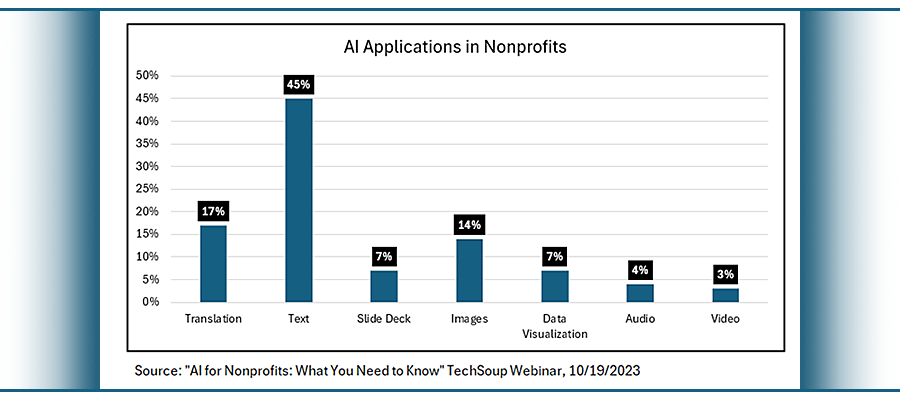Resources Without Humans: AI in the Fundraising World
The use of artificial intelligence (AI) in the fundraising world has been a trending topic recently, as fundraisers strive to adopt the technology while exercising caution regarding its use.
AI has existed in some form since the 1950’s. It is defined as building better machines so that they can replicate human thought. Since then, the technology has adapted and improved as more of people’s lives are online and the resulting data has become digitized. Some of the largest and most prominent technology companies like Microsoft, Apple, and Meta have made large investments in AI’s future, betting that the technology will change the way people live and work. In many ways, AI is already here, used in voice and facial recognition technology, chatbots, digital assistants, and e-commerce.
Like many industries, AI has been eased into use in fundraising. Organizations appreciate the potential of AI reducing the time spent on menial tasks, like email copy or acknowledgements. At a recent national conference for the nonprofit industry, a presentation on how AI was currently applied was shown. The data represents responses from a survey of nonprofits on how they are using AI within their organization.
It is not surprising that the most often cited use of AI is in writing and editing text. Popular AI tools like ChatGPT have emerged as timesaving, user-friendly writing assistants. A user tasked with writing 20 separate fundraising emails during a busy calendar year-end season would certainly benefit from AI-assistance. An AI application can also produce a first draft of an appeal letter based on specifications, which can be edited and refined to make the end result more “human.” Organizations with a large international presence benefit from AI translation applications. AI-generated images are available through resources such as Canva.
Despite the progress and increased adaptability of AI tools, there are still many reasons to proceed cautiously.
1) Donors, especially high-value donors, may not respond well to correspondence obviously written by an AI program.
2) Leadership can be apprehensive about turning key business tasks over to AI due to fear of errors.
3) Some AI disciplines, like data analysis, require frequent double-checking of results.
4) AI tools can discriminate or harbor unintentional bias.
5) Because of the vast amount of data processed and stored through AI, data security is paramount.
Many organizations and agencies use AI tools to streamline their operations. However, they are proceeding with caution as the potential pitfalls are real and could have, in the case of a data breach, disastrous consequences. So, while the technology is advancing rapidly, like the self-driving car, we are best advised to move forward but without taking our hands of the wheel.
As you explore the transformative potential of AI in the fundraising world, we invite you to partner with us. With our team of knowledgeable experts, you can harness the power of AI to enhance your fundraising efforts and achieve greater success. Together, we can navigate the future of fundraising with confidence and innovation.


